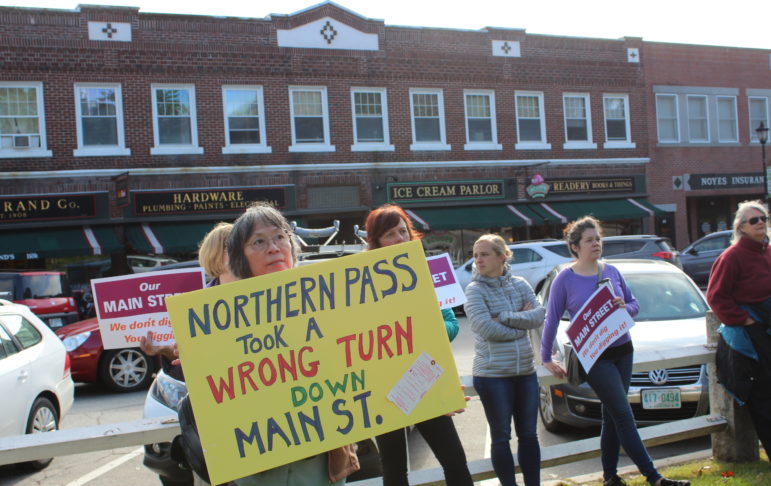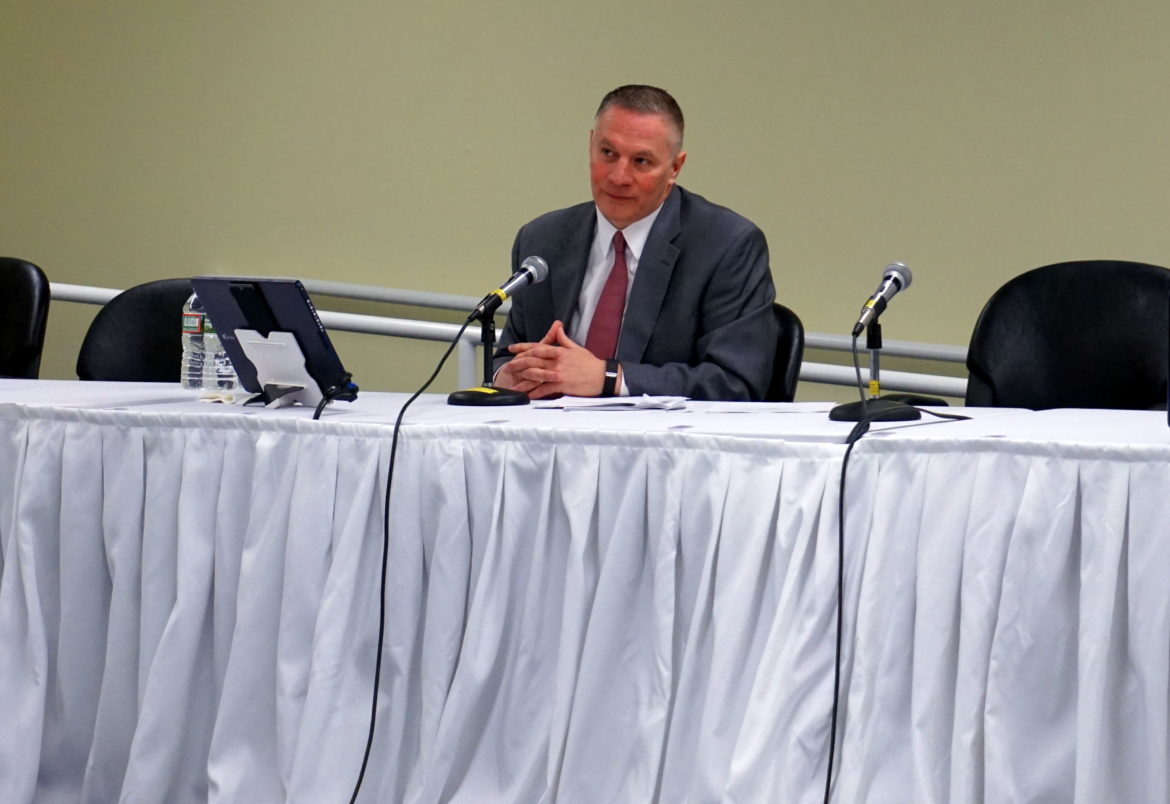By GARRY RAYNO, InDepthNH.org
While the Northern Pass transmission project awaits regulators’ decision in New Hampshire, Massachusetts energy officials announced it is the only one of 46 proposals selected to move forward in its Clean Energy project.
Massachusetts officials said Thursday the Northern Pass project to supply about 1,200 megawatts of Hydro-Quebec electricity will begin negotiations with the state electric distributors on a 20-year contract to supply about 17 percent of the state’s electricity.
The 192-mile, $1.6 billion transmission line has yet to be approved by the Site Evaluation Committee in New Hampshire, which begins four weeks of deliberations Tuesday before issuing a decision by the end of February.
But Massachusetts Department of Energy Resources Commissioner Judith Judson said Northern Pass stood above the other proposals.
“It rose to the top in terms of net benefit to consumers, as well as its ability to quickly deliver clean energy to the Commonwealth,” she said, although she noted if the project fails to win New Hampshire approval, the other proposals would be reevaluated.
Bill Quinlan, Eversource NH president, which is developing the controversial, high-voltage transmission line, believes the project’s “maturity” and the reliability of Hydro-Quebec electricity are key reasons it was selected as the only proposal to go forward.
Company officials say an accelerated construction schedule will have the project on line by the end of 2020, a requirement of the Mass Clean Energy RFP.
Quinlan said on a conference call with reporters that construction would begin this spring at the proposed converter station site in Franklin, at the sub-station expansion site in Deerfield and along the 52 miles of buried line through the White Mountain National Forest, if the project receives a certificate from the Site Evaluation Committee.
“I am, however, confident we will receive a permit, and we hope not to have to seek re-hearing or a court appeal,” Quinlan said. After the SEC issues its written decision in March, both sides – Northern Pass and project opponents – have 30 days to ask for a rehearing which would likely be denied, and that could send the issue to the state Supreme Court.

Nancy West photo
Mary Lee and other protesters gathered in Plymouth last October to say No to Northern Pass.
The proposed transmission line stretching from Pittsburg to Deerfield has generated enormous opposition all along the route but especially in the new right-of-way in far Northern New Hampshire, along the buried section from Bethlehem to Bridgewater, and in Deerfield where a substation would be expanded to connect the power to the New England grid.
Many project opponents want the line buried along Interstate-93 or in existing utility right-of-ways where much larger towers will be built for the project.
Many intervenors at the 70 adjudicative hearings stretching from April to December, said the project would permanently scar the face of the state, hurt the state’s economy, lower home values, destroy sensitive environments and disrupt the lives of those along the route.
Among the intervenors opposing the project is the Society for the Protection of New Hampshire Forests, which asked the SEC to deny Northern Pass’ application, saying “the project also failed to demonstrate that it would be in the public interest of New Hampshire,” said Jack Savage, vice president of communications and outreach for the forest society.
“We anticipate that decision-makers in the Granite State will pay closer attention to the adverse environmental impacts of Northern Pass, as it is New Hampshire towns, landowners and businesses that are being asked to bear the burden of more than 1,000 high voltage towers through our scenic landscape.”
But project developers and supporters say it will provide clean energy reducing carbon emissions, lower electric costs, provide jobs, increase property tax revenue for host communities and help spur economic growth.
Labor unions, large businesses and business organizations have backed the project.
Brian Murphy, Business Manager for the local chapter of the International Brotherhood of Electrical Workers applauded the Massachusetts decision.
“The Northern Pass Transmission project not only brings tremendous clean energy benefits to our region, but will also provide opportunity for thousands of working families in Massachusetts and New Hampshire,” Murphy said. “The IBEW looks forward to getting to work on the Northern Pass project in the coming months.”
The decision was also backed by New Hampshire Gov. Chris Sununu.
“It comes as no surprise that Massachusetts agrees that Northern Pass, a great New Hampshire project, is ready to go,” Sununu said. “This renewable energy project creates over a thousand New Hampshire jobs and lowers electric rates – a win for everyone.”
But other power generators and other utilities with proposals before the Massachusetts selection committee, differed with the governor.
Dan Dolan, president of New England Power Generators Association, said his organization is extremely disappointed, but not surprised, to see today’s announcement.
“Eversource wrote the RFP, and by picking their own project as the winner, have made consumers the losers,” he said, noting this and other recent projects are trying to redo policies established under electric industry deregulation.
The president of National Grid, which had two proposals before the Massachusetts selection committee, expressed similar concerns.
“We continue to join with our fellow projects to encourage the Evaluation Committee to provide full transparency into the evaluation process and decision, to ensure public trust in this historic decision,” said John Flynn, president and COO, U.S. Strategic Growth, National Grid Ventures.
Massachusetts officials said the criteria used to select the Northern Pass proposal includes an economic evaluation of ratepayer benefits, ability to meet goals established by the Global Warming Solutions Act, as well as environmental impacts.
If the project is approved in New Hampshire and Northern Pass can negotiate an acceptable contract with Massachusetts energy officials the project would use Northern Pass’s entire capacity.
Quinlan said the contract would mean Massachusetts ratepayers pay for the first 20 years of project costs and Hydro-Quebec would pay for the next 40 years.
He said financing is separate and would not be affected by Thursday’s decision. And Quinlan said he believes the Massachusetts decision will not affect the SEC’s decision.
The Massachusetts legislation emphasizes new renewable energy sources and transmission systems to deliver “clean power” to southern New England.
The selection committee is comprised of representatives from Eversource, National Grid and Unitil with the DOER as an advisor.
Massachusetts officials hope renewable energy, which has no fuel costs, will help drive down regional prices and provide a more economically stable wholesale market, while reducing greenhouse gas emissions.
Quinlan said hydro power currently represents a very small portion of the energy mix in New England which is dominated by natural gas and nuclear generation.
He said the additional hydro power will represent about 20 percent of the region’s generation. Northern Pass has until March 27 to negotiate a long-term contract before it is presented to the Massachusetts Department of Public Utilities in April.
Garry Rayno can be reached at garry.rayno@yahoo.com.





